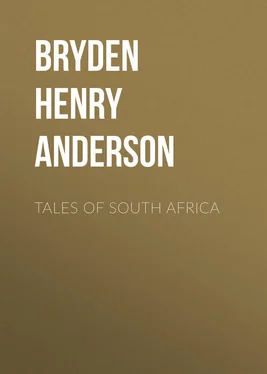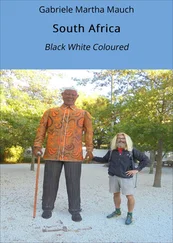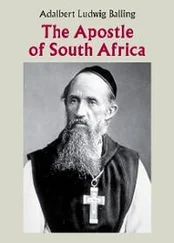Henry Bryden - Tales of South Africa
Здесь есть возможность читать онлайн «Henry Bryden - Tales of South Africa» — ознакомительный отрывок электронной книги совершенно бесплатно, а после прочтения отрывка купить полную версию. В некоторых случаях можно слушать аудио, скачать через торрент в формате fb2 и присутствует краткое содержание. Жанр: foreign_antique, foreign_prose, foreign_language, на английском языке. Описание произведения, (предисловие) а так же отзывы посетителей доступны на портале библиотеки ЛибКат.
- Название:Tales of South Africa
- Автор:
- Жанр:
- Год:неизвестен
- ISBN:нет данных
- Рейтинг книги:4 / 5. Голосов: 1
-
Избранное:Добавить в избранное
- Отзывы:
-
Ваша оценка:
- 80
- 1
- 2
- 3
- 4
- 5
Tales of South Africa: краткое содержание, описание и аннотация
Предлагаем к чтению аннотацию, описание, краткое содержание или предисловие (зависит от того, что написал сам автор книги «Tales of South Africa»). Если вы не нашли необходимую информацию о книге — напишите в комментариях, мы постараемся отыскать её.
Tales of South Africa — читать онлайн ознакомительный отрывок
Ниже представлен текст книги, разбитый по страницам. Система сохранения места последней прочитанной страницы, позволяет с удобством читать онлайн бесплатно книгу «Tales of South Africa», без необходимости каждый раз заново искать на чём Вы остановились. Поставьте закладку, и сможете в любой момент перейти на страницу, на которой закончили чтение.
Интервал:
Закладка:
Not a little cheered by the meeting with Kwaneet, Nakeesa held steadily on her course till sundown, and for the second night slept upon the spoor of her husband and the now dying giraffe. Again with the earliest streaks of light she rose and pursued her journey. Her babe was very fretful. She herself yearned for the end of the travel; even for a Bushwoman ground nuts are but poor sustenance for a three days’ foot journey, under a heavy load, and smitten by a parching sun. Only the immense vitality and the silent capacity for endurance characteristic of these desert-bred Masarwas sustained her. In the early cool of this fair African morning Nakeesa passed through tracts of leguminous bush, decked in a bravery of lilac-coloured blossom. As she emerged upon a broad opening, a troop of noble gemsbok stood at gaze at fifty paces, then cantered leisurely away, their long, spear-like horns glinting to the sunlight. But neither the splendour of the dawn, nor the pleasant flowers, scarcely even the great antelopes, had any attraction for Nakeesa’s eyes.
At last, just upon hot noon, Nakeesa looked skywards, and saw against the hard, torrid glare bands of vultures wheeling and circling high above the earth. There, at last, was her goal. Below the foul birds the giraffe undoubtedly lay dead. Sinikwe’s presence alone kept them aloof. In half an hour Nakeesa stood by the carcase and greeted her husband. Sinikwe paused in his operations – he was chopping ribs from the huge frame, and from head to foot was smeared and stained with blood. For once he was in a good humour; blood and meat had rendered him mellow, as with wine. The day passed in butchering and drying meat, in a continual round of feasting. At night, by the fire, Sinikwe, utterly gorged and drunk with flesh, lay down to sleep. Nakeesa had had enough, but she had not eaten in so gross a manner as her lord. Even to the woman of the desert there seem intuitively to come restraints and limits, which to the man are unknown.
The stars came sparkling forth in their hosts, the deep indigo hollow of space intensifying their marvellous brightness. Amid that galaxy of diamonds, the Southern Cross, Orion’s Belt, the Great Dog, Centaurus, Cetus, and many another constellation, stood majestic.
Presently the weird, shrill wail of the jackal and the hideous cry of hyaenas told that even in these dry wastes the night creatures were wandering in search of food. These sounds disturbed not Nakeesa, though she heard them; she knew that the fire and the presence of human life would sufficiently protect the giraffe’s carcase. There were no lions so far from water. Towards midnight the risen moon, now nearly at her full, shone broad upon the veldt. Her intense brightness made clear all things upon the desert, and paled the stars. The night grew very chill as the hours crept by. Unconsciously, Nakeesa and her man lay yet closer to the fire. It was an hour past midnight when Nakeesa suddenly awoke. Neither the strong moonlight nor the fretful cries of the jackals had roused her, but an almost imperceptible vibration of the sand somewhere near. What danger was it? Very softly she raised her head and peered from beneath her cloak. Yes, she was right; there, ten yards away, something crawled over the dry red sand. Under the amazing brilliancy of the moon it was quite clear to Nakeesa what the thing was. It was a great puff-adder; and the gentle vibration of the reptile’s scales against the sand, as it slowly crawled, had aroused her.
The moon shone bright against one side of the loathsome creature, making clear beneath its searching rays the flat venomous head, the vile, wicked eye, nay, even the very scales of the swollen serpent. Upon the other side, as Nakeesa saw, a narrow band of ink-black shadow moved with the slow motion of the reptile. All this Nakeesa noted instantly. What enthralled her attention yet more was the direction in which the puff-adder headed. It made directly for Sinikwe, attracted instinctively by the promise of warmth. At any other time, probably, the Bushman would have awakened – his instincts would have warned him; but now, overcome by the debauch of flesh, he slept on.
Meanwhile, as the snake slowly approached her man, something like a struggle arose in Nakeesa’s breast. Conscience goes for little in the wilds, yet something like conscience told her that if the puff-adder reached Sinikwe and caused his death, hers was the blame. But, she argued, he is a desert man and can surely protect himself. She ignored wilfully his gorged, helpless slumber; she thought only of Kwaneet, of her own wrongs. After all, human life is of small account with the Bushman; he must take his risks. She had seen her own mother’s corpse half devoured by a lion; her brother had died disembowelled by a buffalo’s horn. What is death in the desert? Here was fate in the form of a puff-adder. Why should she interfere with it? So reasoned Nakeesa as the moments fled. The serpent reached Sinikwe; it crawled slowly, slowly beneath a corner of his skin cloak, close to his breast and arm, and lay still.
For two hours Nakeesa lay watching in a frozen silence the end of this terrible business. At last Sinikwe stirred. The weight of his body shifted heavily on to the snake; there was a struggle beneath the cloak, a dreadful cry arose from the Bushman, and then, like a mad thing, Sinikwe leapt to his feet. The hideous reptile, its long curved fangs still fixed deep in the man’s breast, hung on, as these snakes will do. Sinikwe took the vile creature by the neck, tore it from its hold, and flung it to earth. Nakeesa meanwhile had sprung up, as if from sleep, and snatched up the assegai. With a blow she broke the serpent’s back, and then with the sharp blade cut off its head.
But for Sinikwe life was now as good as ended. Despite his Bushman remedies, the poison quickly overpowered him. After an hour and a half of dreadful pain, gallantly borne, he fell into a torpor. As the sun rose he lay upon the sand there dead.
An hour after sunrise Nakeesa quitted the spot. She left the body to the vultures and jackals and hyaenas. A Bushman needs no burial. Taking as much meat as she could carry, the unfinished water, and her child, she set off to join Kwaneet. It was a long two days’ journey, this time cheerfully endured. Before sunset of the second day, she squatted herself down by the side of the man of her choice, at the water of Makwa.
“I am here, Kwaneet,” she said. “Sinikwe is dead. A snake slew him at night by the giraffe. Take me, I am thine.”
So Kwaneet, not displeased, took Nakeesa to wife, and for a year or more they wandered about the desert, hunting, drinking at this pit and that; sometimes, when the drought gripped that thirsty land, devouring the bitter water-melons in place of drink, as they roamed the great deserts and followed the game. Those were the pleasantest days of Nakeesa’s hard life. She had never known flesh so abundant; they wandered far afield into the most secluded haunts of the game, and Kwaneet had never been so successful in his hunting. Moreover, Kwaneet was neither a difficult man to live with, nor a hard master, and Nakeesa, by nature, like many Masarwa women, a great conversationalist, soon found herself acquiring a strong influence over the simple, easily managed hunter. Yet she had a great affection for Kwaneet, and tempered her sway with many little amenities.
In their second winter together the drought had been intense; not a pit or sucking-hole held water in the desert, there were no melons, and the game had nearly all trekked for the rivers. And so Kwaneet and Nakeesa, too, had quitted the open veldt and the waterless forest, and lived temporarily on the banks of the upper Tamalakan, north-east of Lake Ngami.
One morning Kwaneet came back to their camping-place with a piece of welcome news. Half a mile away he had found the carcase of a fat zebra, killed by a lion quite recently, and only a quarter devoured. Here was a ready-made feast, without the trouble of hunting. Nakeesa had two children now; her elder, a boy, by Sinikwe, a precocious little Bushman imp, could toddle alone; her younger, Kwaneet’s son, she still carried. They set off together along the river, which was now swarming with bird life. Roseate flamingoes and ibises, lovely egrets, storks and cranes and herons, were to be seen decking the shallows. Charming jacanas with chestnut plumage, white and golden gorgets, long legs, and the slenderest spidery feet, ran in little troops upon the thinnest film of floating vegetation. Great spur-heeled Senegal cuckoos flapped heavily from one reed-bed to another. Duck, geese, widgeon, and teal thronged the spreading waters, and clamoured incessantly. A hippopotamus or two blew in the distance; sluggish crocodiles floated, log-like yet watchful, in middle stream. For the Masarwas, who love the dry deserts, and shun the haunts even of black mankind, all this wealth of river-life seemed a very welcome and a very novel change. But then there was a kraal of Makobas within five miles, which was a drawback.
Читать дальшеИнтервал:
Закладка:
Похожие книги на «Tales of South Africa»
Представляем Вашему вниманию похожие книги на «Tales of South Africa» списком для выбора. Мы отобрали схожую по названию и смыслу литературу в надежде предоставить читателям больше вариантов отыскать новые, интересные, ещё непрочитанные произведения.
Обсуждение, отзывы о книге «Tales of South Africa» и просто собственные мнения читателей. Оставьте ваши комментарии, напишите, что Вы думаете о произведении, его смысле или главных героях. Укажите что конкретно понравилось, а что нет, и почему Вы так считаете.












